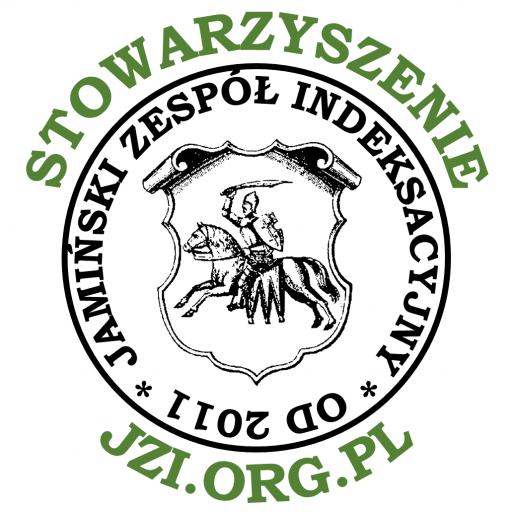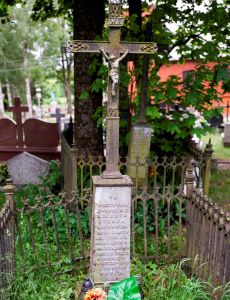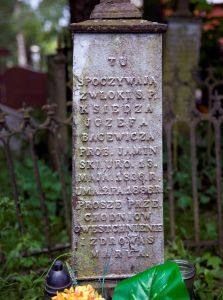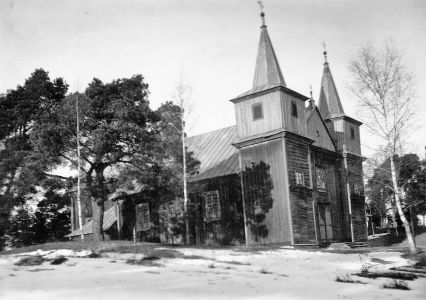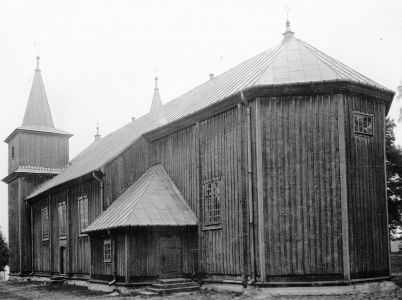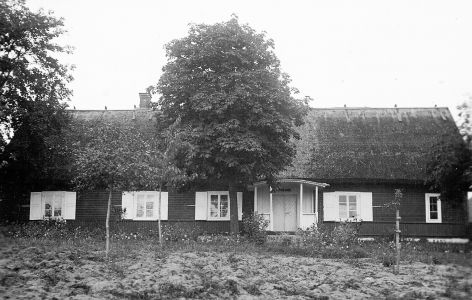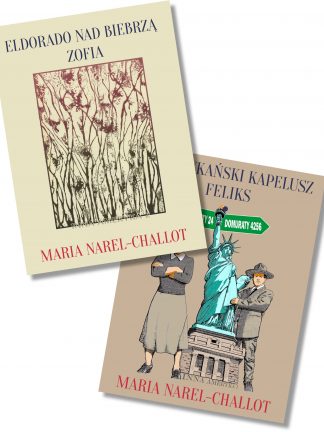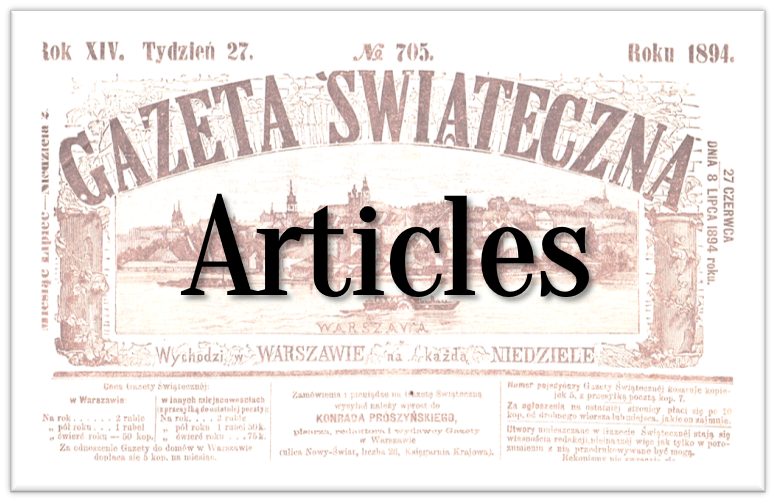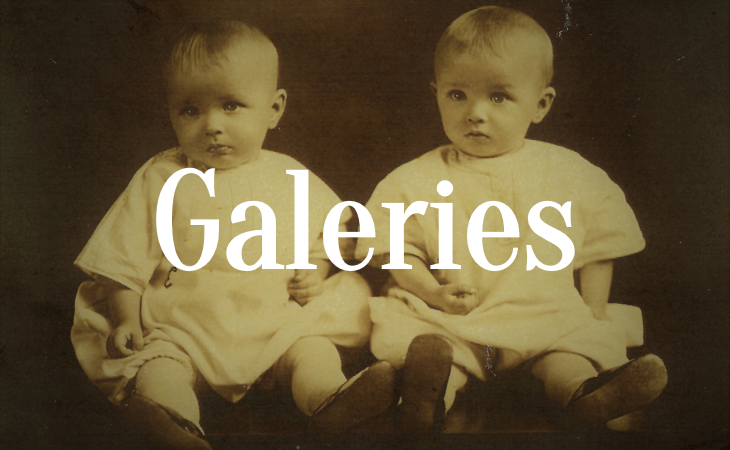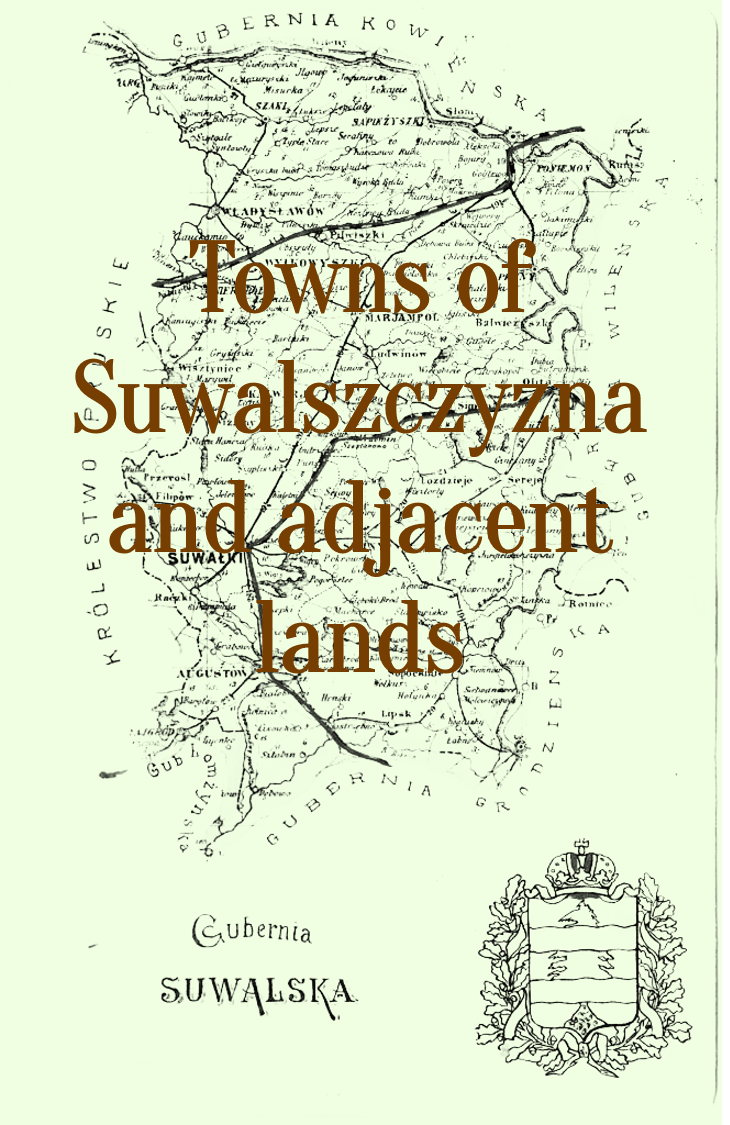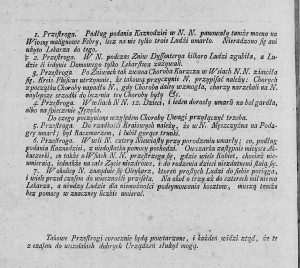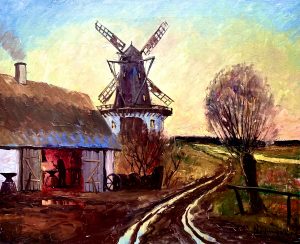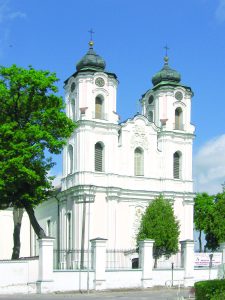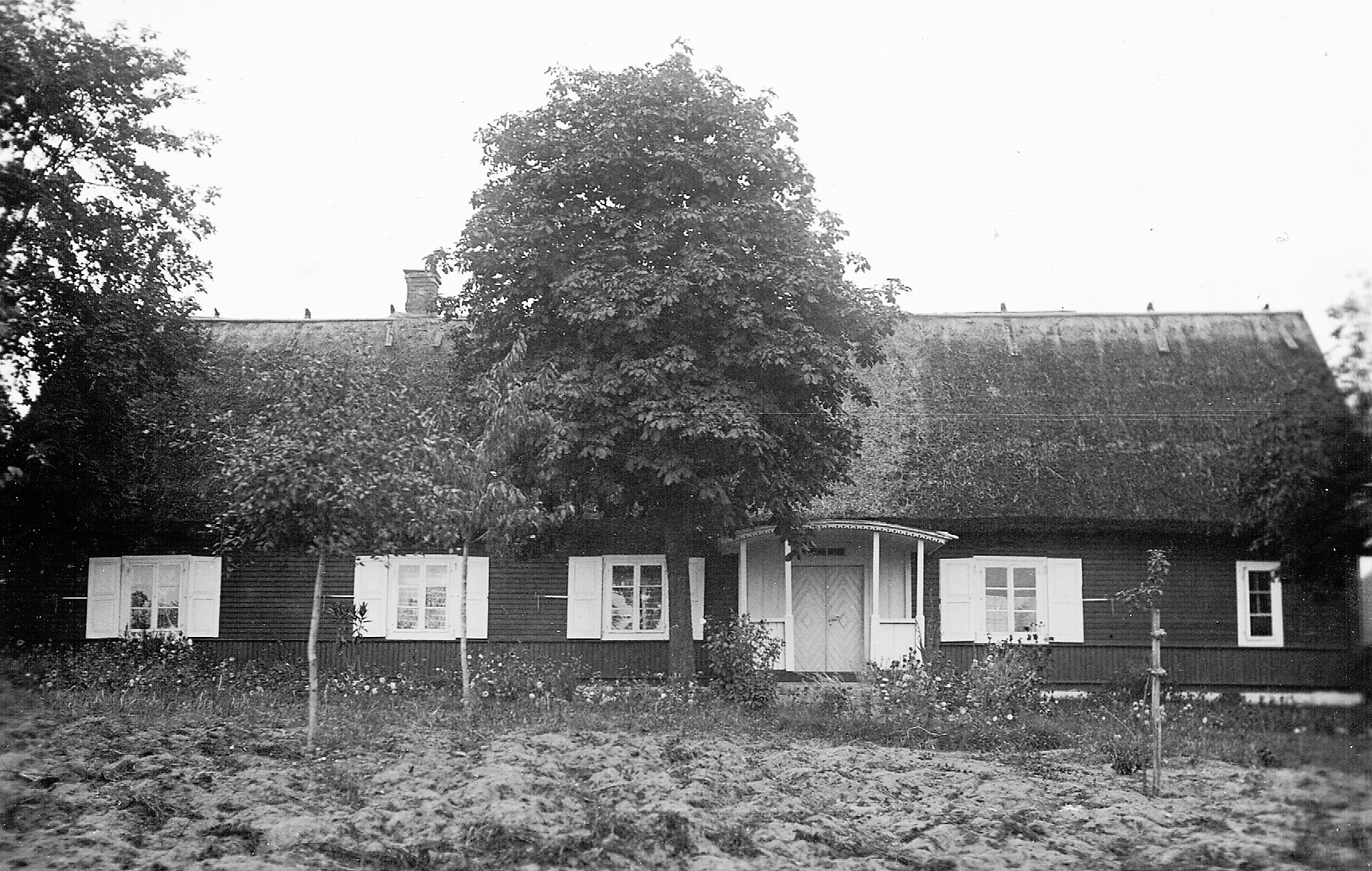
In 1882, the local community was shaken by the assault of a group of thugs on the presbytery in Jaminy and the severe beating of the local priest, Fr. Józef Bacewicz. Fr. Bacewicz was born in 1836 in the town of Pejlany, and administered the Jaminy parish from 1874. He was a pastor valued by the community, as evidenced by the description of his job published in the newspaper by one of the faithful:
"He was a good man and a priest who, despite his poor health, but worked as much as he could to moralize the people and help anyone in need, both with advice and donation. It was his and the then head of the village, the late Mr. Ostapowicz, effort who gathered donations and the church was renovated, its interior was repainted with oil paint; three altars were renovated and gilded: a stone wall was built around the church and a burial cemetery after which non-cattle stopped roaming today opposite to the past, a new presbytery was built, and the roofs and all presbytery buildings were improved"[1]
One of the newspapers of the time reported in 1882 about the robbery: "In the village of Jaminy, Augustów pov., on the night of 8 to 9 this month. z dozen villains attacked the presbytery, tied up the sleeping priest and threw him into the hall and took the robbery themselves. When, however, the host closest to the presbytery informed about the assault by the priest's hostess, an old woman who managed to slip away, hurried to help the priest with a pitchfork, at the sight the bodyguard fired a few shots from a revolver, on the sound of which the whole band got out of the presbytery quickly and escaped."[2]
The assault was an indirect cause of the premature death of Fr. Bacewicz. He died at the age of 50, on October 3, 1886, and his grave is still today in the Jaminy cemetery and is probably one of the last gravestones cast in the declining Huta Sztabińska.
The entire description of the villains' trial was published in "Kurier Poranny" No. 104 of 4/16 April 1883 in the following article:
From the Court Room
The three peasants of the Suwałki Governorate Ostrowski, Wolf Szwartz and Tomasz Trzciański were accused. The first two of robbery assault on Father Bacewicz's house and the last of them of hiding things from this crime. On 28 January at night, the criminals in the village of Jaminy together with other people, in order to rob the property, broke off the entrance door of the house of priest B. attacked his apartment and beating and tying him with a rope, openly robbed various things and money belonging to B. One of the accomplices of the crime at the time of the robbery had a revolver, from which two shots were given to people who came to help Father B. This crime refers to art. 1629 of P.C. This case in the first instance was tried by the Suwałki regional court.
... None of the accused pleaded guilty.
Father Bacewicz, questioned at a court hearing, testified that on the night of January 28, at about midnight, he was suddenly awakened by a stab to the entrance door. When the candle was lit, the witness wanted to investigate the reason for this patter, but at the moment the louder patter could be heard from the back entrance to the kitchen. Under strong pressure from the outside, the door opened and the witness heard several people burst into the kitchen with terrible abuse and hurried toward his bedroom. Guessing that they were robbers, the witness wanted to escape through the front door, but in the hall he was attacked by three unknown people who began to beat him on the face, back and whole body with wooden clubs brought with them. The witness began to shout, Jesus, Mother of God, two more villains came in from the inner rooms and all five pushed him out into the corridor, tied up with ropes. and tied to the door handle so that his face hung to the ground and the hands for which he was tied were stretched up, in this position they asked him where the money and papers were, but he replied that he had nothing. The robbery lasted about a quarter of an hour, until the arrival of the neighbors Joka and Kunda who forced the villains to move away with those things and money they managed to rob. Looking around, the witness noticed the theft of a silver watch and snuffbox, various papers and money for the sum of over rubles 1,000 of which rubles 50 were church money. Money and papers were in drawers of the dresser and in two chests in the closet. The locks on these drawers and trunks were broken, somehow with a chisel-like tool.
Some papers lay on the floor and had traces of blood left behind by one of the villains. From the number of villains the witness saw only five. Four of them had beards, they could be between 30 and 40 years old, and were Jews due to the fact that although they abused and spoke in Russian, the Jewish accent was clearly heard in the pronouncement, especially in the word "papiry". These people are completely unknown to the witness and he can't remember them now because he was very scared. The fifth was apparently a Catholic because he had no beard. He had a mask on his face that covered half his face. From the height, composition of the head and general impression, the fifth one strongly resembles the accused Ostrowski, but whether he was him, the witness can not say firmly, because he did not know Ostrowski personally. The villains left a glove amongst others, which the witness recognizes in the number of material evidence.
A month after this crime, the witness received from the head of the Szczuczyn poviat the documents that were in the drawer of the dresser and were probably stolen during the robbery along with other papers and money. Besides, the witness had not seen them in his home for many years, because he did not need them.
Służąca Sobolewska i Fedrowska poznały Ostrowskiego i Szwartza a O. był w masce, lecz widać, było oczy, czoło i dolną część twarzy. Szwartza zaś zauważyły dobrze dlatego że on trzymał Sobolewską, kiedy inni podbiegli za Bacewiczem. Sobolewska słyszała w ‘domu księdza strzały. Świadek Kunda i Soha zeznali, że kiedy dążyli do domu księdza, na kilkadziesiąt kroków od domu spostrzegli jakiegoś człowieka, który strzelał do nich dwa razy, ale bez rezultatu. Kiedy Sobolewska i Fedrowska mówiły, że poznały w liczbie innych złoczyńców Ostrowskiego ze wsi Czarnego Lasu, zaraz posłano do owego sołtysa, lecz nie zastał on go w domu.
The head of village, Mr. Ostapowicz, when received information about the robbery, arrived at the priest at 3 am, whom he found in the bed sick and beaten, then, when learned from his servants that in the number of villains they had met Ostrowski, he went straight to him and found him at home still asleep. On his bed lay a gray capote with metal buttons of steel color (in such capote Sobolewska had just seen him at the time of the robbery), and on his shoes he had traces of not yet melted snow. Ostrowski explained that he was coming back from the tavern Wozgał, where he went to buy wool, and when a witness brought him to the village of Jaminy, he asked if he was arrested for a robbery of the priest. The witness found traces of several people in the snow by the priest's kitchen, and two clubs by the fence. A few days later, the witness again searched the house of O. and found two iron nails, which later the investigating judge matched to holes made when breaking drawers and found that they completely fit. Ostrowski's job was nothing more than theft and he was in prison more than once.
Witness Nowicki testified that the day before the robbery in Jaminy, a Jew from the city of Suchowola, named Wolfko, whom the witness recognizes in the accused Szwartz arrived to him.
This Wolfko came to him, said that he wanted to buy hay, and in the past he never came to Czarniewo. Not buying, he went to Czarny Las for the same thing, and returned home from there in two hours. Witness Kunda also saw a Jew with a little boy, he was at her father's to buy hay the day before the robbery. The witness did not look at this Jew, but when the Jew asked for a bucket to water his horse, she followed him with a bucket onto the road and they talked to each other at the well.
Returning to the room O. quickly called for a supper, and then declared that he has to go to purchase oxen and maybe he would not be back in three or four days. Late at night, O. returned and entered the room and called out: "Oh, let the damn kill you" and when his daughter Anna asked him what had happened, he said: "He has robbed the priest in Jaminy, morover they killed him, they almost killed him." Asked quietly if he was not recognized, he said that he could not be recognized because he had a mask on his face. Shortly afterwards, the head of the village arrived and arrested Ostrowski.
Against Trzciański, there is a circumstantial evidence that he was hiding the items of Fr. B, however this has not been proven by the court. The fact that one and a half verst from his apartment papers of no value belonging to Father B. were found, is no evidence against him when there is no evidence that he put them under the bridge; the more that this place is very busy, and it could have been someone to mislead the police with proper traces of the crime.
After hearing the entire investigation, the District Court found Ostrowski and Szwartz guilty and sentenced them to deprive them of all rights and to send them to heavy labor in fortresses for 10 years each, and after that time to settle in Siberia. Trzciański was completely released from punishment.
Since that judgment, Ostrowski and Szwartz have appellated to the Warsaw court chamber which heard with the lawsuit yesterday. The court chamber, after hearing the course of the case in the first instance, followed by prosecutor Kowalewski and for weapons. after Ostrowski, sworn lawyer Wagner and behind Szwartz, adv. Gluksberg, decided that the judgment of the Łomża District Court was quite properly issued and approved, thus dismissing the defendand's appellate. Defender of Szwartz adv. Gluksberg intends to submit a cassation complaint to the Senate regarding his client because of an improper investigation of the case by the investigating judge.
(Original spelling retained)
Tekst ukazał się również w numerze 3/2020 miesięcznika “Nasz Sztabiński Dom”
[1] "Gazeta Świąteczna”, 1887, no 229-330, p. 6.
[2] „Wiek, Gazeta polityczna, literacka i społeczna”, Warszawa 1882, no 38, p. 3
- Studzieniczna - 26 May 2020
- Assault on the presbytery in Jaminy - 12 March 2020
- Peowiacy z gminy Sztabin - 13 February 2020
